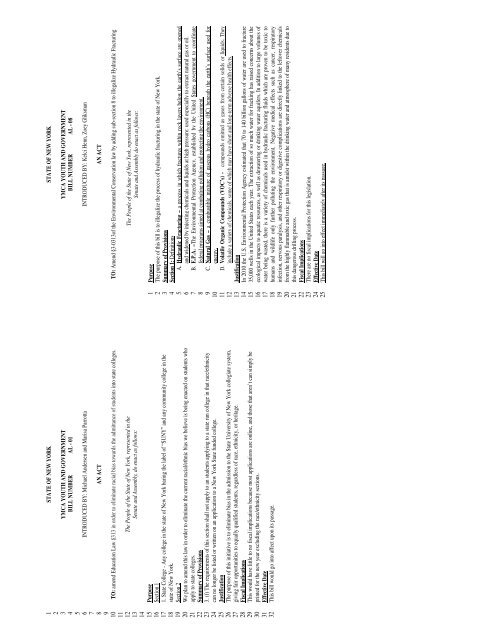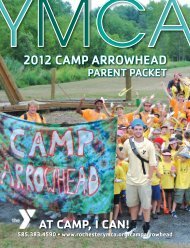2012 Conference Executive Record Report.pdf - YMCA of Greater ...
2012 Conference Executive Record Report.pdf - YMCA of Greater ...
2012 Conference Executive Record Report.pdf - YMCA of Greater ...
Create successful ePaper yourself
Turn your PDF publications into a flip-book with our unique Google optimized e-Paper software.
1<br />
2<br />
3<br />
4<br />
5<br />
6<br />
7<br />
8<br />
9<br />
10<br />
11<br />
12<br />
13<br />
14<br />
15<br />
16<br />
17<br />
18<br />
19<br />
20<br />
21<br />
22<br />
23<br />
24<br />
25<br />
26<br />
27<br />
28<br />
29<br />
30<br />
31<br />
32<br />
STATE OF NEW YORK<br />
<strong>YMCA</strong> YOUTH AND GOVERNMENT<br />
BILL NUMBER AL - 01<br />
INTRODUCED BY: Michael Andersen and Marisa Parrotta<br />
AN ACT<br />
TO: amend Education Law §313 in order to eliminate racial bias towards the admittance <strong>of</strong> students into state colleges.<br />
The People <strong>of</strong> the State <strong>of</strong> New York, represented in the<br />
Senate and Assembly, do enact as follows:<br />
Purpose<br />
Section 1<br />
1. State College - Any college in the state <strong>of</strong> New York baring the label <strong>of</strong> “SUNY” and any community college in the<br />
state <strong>of</strong> New York.<br />
Section 2<br />
We plan to amend this law in order to eliminate the current racial/ethnic bias we believe is being enacted on students who<br />
apply to state colleges.<br />
Summary <strong>of</strong> Provisions<br />
3. (f) The requirements <strong>of</strong> this section shall not apply to an students applying to a state run college in that race/ethnicity<br />
can no longer be listed or written on an application to a New York State funded college.<br />
Justification<br />
The purpose <strong>of</strong> this initiative is to eliminate bias in the admission to the State University <strong>of</strong> New York collegiate system,<br />
giving fair opportunities to equally qualified students, regardless <strong>of</strong> race, ethnicity, or heritage.<br />
Fiscal Implications<br />
This would have little to no fiscal implications because most applications are online, and those that aren’t can simply be<br />
printed for the new year excluding the race/ethnicity sections.<br />
Effective Date<br />
This bill would go into affect upon its passage.<br />
1<br />
2<br />
3<br />
4<br />
5<br />
6<br />
7<br />
8<br />
9<br />
10<br />
11<br />
12<br />
13<br />
14<br />
15<br />
16<br />
17<br />
18<br />
19<br />
20<br />
21<br />
22<br />
23<br />
24<br />
25<br />
STATE OF NEW YORK<br />
<strong>YMCA</strong> YOUTH AND GOVERNMENT<br />
BILL NUMBER AL - 08<br />
INTRODUCED BY: Kelci Henn, Zoey Gliksman<br />
AN ACT<br />
TO: Amend §3-0313<strong>of</strong> the Environmental Conservation law by adding sub-section 8 to illegalize Hydraulic Fracturing<br />
The People <strong>of</strong> the State <strong>of</strong> New York, represented in the<br />
Senate and Assembly do enact as follows:<br />
Purpose<br />
The purpose <strong>of</strong> this bill is to illegalize the process <strong>of</strong> hydraulic fracturing in the state <strong>of</strong> New York.<br />
Summary <strong>of</strong> Provisions<br />
Section 1: Definitions<br />
A. Hydraulic Fracturing – a process in which fractures within rock layers below the earth’s surface are opened<br />
and widened by injecting chemicals and liquids at high pressure: used especially to extract natural gas or oil.<br />
B. E.P.A. –The Environmental Protection Agency, established by the United States government to coordinate<br />
federal programs aimed at combating pollution and protecting the environment.<br />
C. Natural Gas – a combustible mixture <strong>of</strong> gaseous hydro carbons (HC) beneath the earth’s surface used for<br />
energy.<br />
D. Volatile Organic Compounds (VOC’s) - compounds emitted as gases from certain solids or liquids. They<br />
include a variety <strong>of</strong> chemicals, some <strong>of</strong> which may have short and long-term adverse health effects.<br />
Justification<br />
In 2010 the U.S. Environmental Protection Agency estimated that 70 to 140 billion gallons <strong>of</strong> water are used to fracture<br />
35,000 wells in the United States each year. The extraction <strong>of</strong> so much water for fracking has raised concerns about the<br />
ecological impacts to aquatic resources, as well as dewatering or drinking water aquifers. In addition to large volumes <strong>of</strong><br />
water being wasted, there is a variety <strong>of</strong> chemicals used in hydraulic fracturing fluids which are proven to be toxic to<br />
humans and wildlife only further polluting the environment. Negative medical effects such as cancer, respiratory<br />
infection, nervous paralysis, and other respiratory or digestive complications are directly linked to the leftover chemicals<br />
from the highly flammable and toxic gas that is amidst within the drinking water and atmosphere <strong>of</strong> many residents due to<br />
this dangerous drilling process.<br />
Fiscal Implications<br />
There are no fiscal implications for this legislation.<br />
Effective Date<br />
This bill will go into effect immediately after its passage.
















